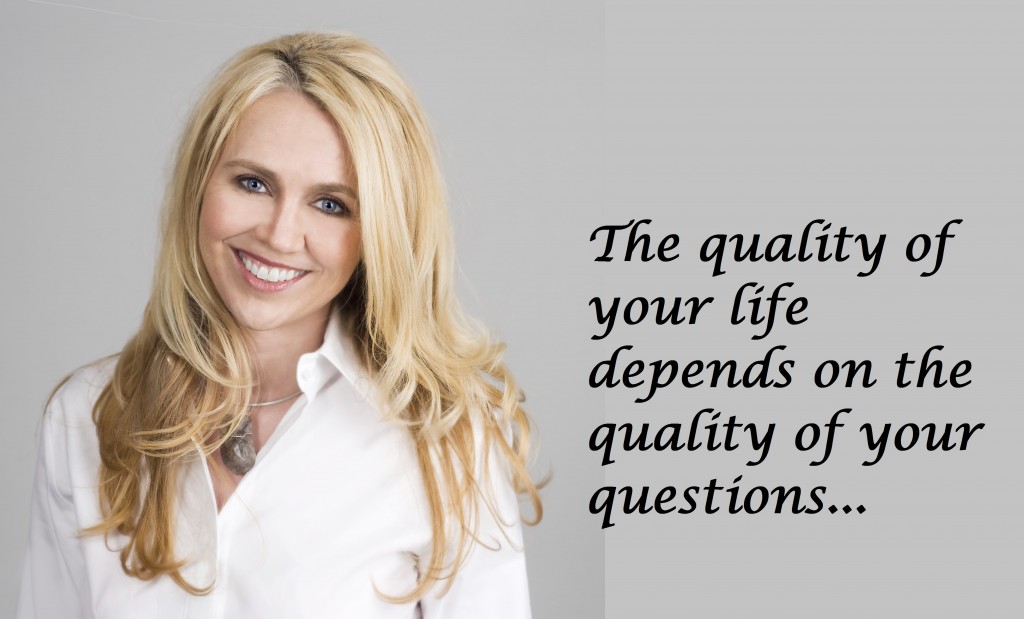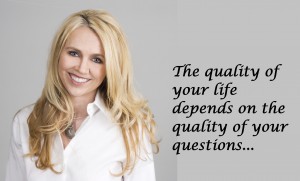We live in a world with unlimited distractions, challenges, emergencies and interruptions – it’s a miracle any of us stay focused, sane and on track towards what we want (business improvement).
There are always going to be multiple tasks and priorities competing for your time – marketing campaigns to design, team members to manage, customers to respond to, business opportunities to explore, personal commitments etc. However, when you try to tackle too many things at the same time, nothing gets done. In the end, success and business improvement come down to focus.
In a world where there never seems to be enough time to get everything done, how can you avoid overwhelm, stay on track and get the things that are most important to you done? After all, it has been said there is always enough time in the day to do everything that is WORTH doing.
Here’s a list of questions that I have compiled over the years and shared with my clients and friends. They have helped me to put every challenge, “emergency” and distraction into perspective so that I can choose to focus my energy on what I really want and move forward toward my goals and business improvement each day. I hope some of these will also resonate with you…
1. Has Anyone Died? If not, relax, take a deep breath and know that as bad as things seem right now, “this too shall pass”. I learned this lesson the hard way when I was twenty four years old and had to come to grips with the terrible news that my mother had been murdered. As horrific and paralysing as this event was in my life, I eventually began to rebuild and discover strength that I never knew I had. And I learned a very important lesson – as long as no one has died, the situation really isn’t that grave, and there is always a solution or upside to every challenge you face.
2. Are You Trying to Eat an Elephant in One Sitting? Breaking things into bite-sized chunks makes the world of difference. Having broad high level business improvement goals are good but oftentimes it is easy to get overwhelmed by the amount of work that has to be done. That’s why having an actionable plan is essential – a step by step plan to help you move forward every day and get from where you are to where you want to be. After all, a journey of 1000 miles begins with one single step.
3. Are You In A Bad Neighbourhood? If you are in the ghetto emotionally, you need to change your physiology immediately. That means get up and get moving – put on your favourite song, connect with someone face to face or do a hobby/sport that makes you smile. Whatever it takes, do it NOW.
4. Are You Grateful For What You Already Have? It is impossible to attract more of what you want into your life if you are feeling ungrateful about what you already have. It has been said that the whole is more than the sum of its parts. In many ways gratitude is a bit like that – it’s not what you say, the mere words that count, but sum of the words and the heartfelt emotion that you put behind them.
5. Are You focused on What You Want or Don’t Want? Whether you realise it or not, you are visualising things all the time – visualising either what you want or don’t want. If you are relentlessly focused on the negative outcome and are riddled with fear, your thoughts will impact your reality and push what you want further away.
6. Does it Have To Be Perfect? Perfection can immobilize you and hamper business improvement – prevent you from making a decision, starting a project or signing off on a piece of important work. Truth is, most tasks on your list don’t have to be 100% perfect, you just need to pull the trigger and sign off on them today. The other way that this problem can show up is when you deceive yourself by believing that no-one else can do the job (even simple routine tasks) to your exacting standard, so you must do it ALL yourself. Try the 80/20 rule – delegate what you do not have to do yourself and give yourself permission to be human!
7. Are You Still Holding On To The Past – Have you ever caught yourself saying “last time I tried that, it didn’t work”? Or have you ever avoided doing something that you know you need to do but were afraid because it didn’t work last time? Even though it’s a good idea to stop doing what clearly isn’t working, it’s also important to remember that the past does not necessarily equal the future. If you catch yourself using reasons from the past to justify why you are not moving ahead today, you owe it to yourself to recognize this for what it is – self sabotage – and take action.
8. Are You Listening To Your Own Inner Voice? – The quickest way to guarantee failure and unhappiness is to worry too much about what other people might think. Deep down you know what is right for you in every circumstance. Sometimes it is tempting to suppress or ignore your gut instincts but there is freedom and relief in choosing to listen and to stand behind the decisions that you know are right for you. If you choose to please others, there will always be at least one other person who is unhappy with your choices, plus yourself.
9. Are You Avoiding Your Fears? – Ironically, everything you want is on the other side of your fear. Sometimes we are coaxed to the edge of our fears and pushed off, yet other times we willingly wander there, oblivious to what lies ahead. Either is good – for at the moment you feel your feet leave the safety of the cliff top – you will always find your wings and fly.
10. Are You Afraid of Making a Mistake? – It is only when we are stretched that we discover new things about ourselves. Often it is adversity and mistakes that allow us to become aware of and uncover our own innate talents. If mistakes were fatal, we wouldn’t enjoy most of the modern conveniences that we take for granted every day. Taking a risk and making a mistake is far better than doing nothing. In the brilliant words of Theodore Roosevelt “the best thing you can do is the right thing, the next best thing is the wrong thing, and the worst thing you can do is nothing”.
11. Do You Have Reasons or Results? – In life you either have results or you have reasons, but it is impossible to have both. If you don’t like the results you have produced, you will do one of two things (1) find a reason or excuse to explain why or (2) change your behaviour to produce a different result. Looking for justification as to why things have not worked out is a pointless exercise. When we look at causes, rather than reasons, things are very different. There is no failure, only results. Essentially, it means never having a reason or excuse again.
12. Are You Unrealistic? In order to succeed and achieve your goal of business improvement, you have to be at least a little unrealistic. Being realistic, never led to any significant change, innovation or giant leap forward. Only unrealistic thinking will achieve a result that until now seemed impossible. In the ‘60s, U.S. President Kennedy seemed unrealistic when he announced to a very large audience that America would put a man on the moon in less than a decade. Prior to that statement, a lunar landing seemed impossible, or at the very least, something that was a long way off.
13. Have You Forgiven Yourself & Others? Perhaps we never really completely understand life until we face death. What if we all started off on our deathbeds? Would it make a difference? Would it change the way we choose to play the game? Would it take us to forgiveness sooner? On our deathbed, I doubt any of us would say ‘I wish I held onto more anger and resentment or took a bit longer to forgive.’ In fact, if you were to look out into the future and imagine the world and all of your relationships from a position where you knew with absolute certainty that they would be gone tomorrow, would you act differently today? Would you mourn the years that you kept yourself enslaved by bitterness, blame and indignation? Would you lament the loss of pleasure, love and peace that could have been yours if only you could have found a way to forgive sooner?
14. Are You Hiding Who You Really Are? – We all have scars, but they are not ‘terminal’ blemishes, evidence of your defects, or validation of your lack of worthiness. Richard Nixon once famously said “the finest steel goes through the hottest fire”. Life isn’t easy but that perhaps it was never designed to be! Amazing things can happen, character and strength often develop through the most challenging circumstances – whether the heat destroys you or sculpts you is entirely up to you.
15. Are You a Poor Communicator? – Anytime you have more than one person observing an event, the door is open for the possibility of misinterpretation and miscommunication based on differing maps of reality. Learning to recognise that we all have different maps (filters by which we see and process the world around us) allows us to see the world through another person’s eyes and therefore understand, relate and communicate with greater respect and results.
16. Are You Thinking Inside Your Box? – Our beliefs about what is true, right, real or possible are largely assembled in childhood through a process called conditioning. Essentially children learn what is ‘normal’ from the people around them. These beliefs about the world can have a massive impact on how your life turns out. Einstein referred to limiting beliefs as the “boundary conditions of our thinking” – they act as a box that we unconsciously put ourselves in from a very young age. What we consider possible is influenced by these rigid ideas. That is why it has often been said that the thinking that got you to where you are now will never get us to where you want to be.
17. Are You Running Away? – Sometimes a fresh start can do you a world of good, but the interesting thing about a fresh start is that it never stays fresh for very long. The irritating part of physical or geographical changes is that you stay the same – wherever you go, there you are. As time passes you are forced to realise that while there may be a new job, new boss, new partner, or a new view out the window of your kitchen – you are exactly the same! Now might be a great time to look at the changes that need to come from within.
18. Are You Over Thinking It? – Most of us make a ‘decision’ today, knowing that tomorrow we can change our mind, backtrack or simply do nothing. That isn’t a decision. Unless you take action immediately towards your goal, you haven’t really decided … you are merely thinking about it.
19. Are You Motivated? – No matter whether you have experienced awful things in life or not, there is an innate drive in all of us to seek meaning and purpose. If we understand our ‘why’ then we can deal with any ‘how’ that life brings our way. Even in the darkest of nights, we can all find a way to let the light of who we really are shine through, if we believe in our hearts that there is a grander purpose.
20. Are You Driving The Bus? – I am the only one who can attribute meaning to the events in my life and the same is true for you. Positive, negative or neutral – the choice is always yours. If you are not happy with the choices you have made so far in life the great news is that you can choose new meanings immediately that will drive you towards your bright and compelling future. It’s never too late to become the person you were meant to be!
21. Are You Your Own Worst Enemy? – In my own life, it has never been the load or the obstacles that broke me, but rather the manner in which I chose to carry them. Despite what happens or what others think/say, it’s the things we tell ourselves when no one else is listening, that have the biggest potential to harm and hold us back. Re-writing negative self-talk is the single biggest gift you can give yourself this year.
It’s very easy to get so caught up in the emotion of emergencies, distractions and thoughts that don’t serve you – you can easily lose sight of what is most important to your success, business improvement and well-being. These simple questions (and keeping your sense of humour) are vital to helping you to stay focused and moving towards your goals and success.
 Many different factors have the potential to cause stress in a person’s life. If you take a look around you will see that some people have learned to manage and control their levels of stress much better than others. Even though there is no 1 specific key or “secret” to manage stress, the answer lies in learning to balance of a combination of little things and your physiology.
Many different factors have the potential to cause stress in a person’s life. If you take a look around you will see that some people have learned to manage and control their levels of stress much better than others. Even though there is no 1 specific key or “secret” to manage stress, the answer lies in learning to balance of a combination of little things and your physiology.
High levels of stress can lead to various medical conditions, negatively impact your daily routine and impair your ability learn and recall. The hormones which the brain releases in stressful situations are meant for fight or flight situations only – over use of these can actually be detrimental to the health of your brain and body.
Work (whether you own your own business or not) is filled with challenges, obstacles and opportunities that have the potential to cause stress. Knowing how this impacts you physically is the first step leading you to new insights and understandings on how to manage and control your reactions in an empowering way.
Your body language is a powerful indication of your ability to handle stress and problems. When your body encounters a stressful situation, hormones are automatically released into your adrenal glands to counterbalance the cortisol in your brain. Equilibrium is established when these stimulating and tranquilizing forces become equal. When one is greater than the other, you will experience a sense of imbalance, commonly referred to as stress.
In fact, your body goes to great lengths to prevent you from experiencing imbalance or stress. Your sympathetic nervous system and parasympathetic nervous system essentially battle each other to bring your body back to equilibrium. This fight or flight response to stress also necessitates the shutting down of many of the other key systems in the body – which makes it much more difficult to reason, react and communicate while in this agitated state.
It is next to impossible to eliminate stress completely from your life. Some stress is actually good for us. However, learning how to quickly and reliably relieve stress and become focused will enable you to tackle challenges with a clear head, communicate clearly and navigate tense situations. In fact, the best way to reduce stress quickly and reliably is through managing the sensory input received by the body: through sight, sound, smell, taste, and touch. Each person responds differently to various levels and types of sensory input – the trick is to find out what works best for you to manage stress.
We all have different preferences, tolerances and needs. For example, certain kinds of music or distinctive smells may relax one person but irritate another. Take the time to discover what works best for you at home, in your car, at the office, or wherever you may encounter stress. Simple deep breathing and relaxation techniques also work wonders and they are free, easy to implement and produce quick results.
Harnessing the power of sensory stress-busting techniques will provide you with a powerful technique for staying calm, collected and in control. You’ll have the assurance to face adversity and challenge in every aspect of your life, knowing that you have the ability to bring your body back into a state of equilibrium and ease.
 Optimists trust that the future will be mostly good – they also believe their decisions, choices and actions shape their destinies. There is evidence to suggest that optimists tend to have better coping mechanisms and tend to be less negatively impacted but life’s little ups and downs. They recover faster, tend to eat right and exercise, are less likely to smoke, suffer less from aches and pains and are at a much lower risk for dementia and other diseases.
Optimists trust that the future will be mostly good – they also believe their decisions, choices and actions shape their destinies. There is evidence to suggest that optimists tend to have better coping mechanisms and tend to be less negatively impacted but life’s little ups and downs. They recover faster, tend to eat right and exercise, are less likely to smoke, suffer less from aches and pains and are at a much lower risk for dementia and other diseases.
But what if you’re not a natural born optimist? Studies seem to indicate that optimism is only slightly influenced by genetics – 20% at best. In fact your experiences, the language you use to describe them and the meanings that you have attributed to them shape your world and your future outlook. Every single one of us can learn to become optimistic. However optimism is not achieved by making a decision one day to be optimistic – it takes more than attempting to change your feelings or outlook consciously.
Particularly in this time of economic uncertainty, faith and optimism are powerful belief structures. Arguably however, both are habits and need to be developed and nurtured over time. In fact 99% of what we do is pure habit – the domain of the subconscious.
Positive thinking alone is inherently undependable. Sustained optimism requires more than The Secret, The Law of Attraction and a few positive affirmations. Optimism is not something you are born with – it is a learned behaviour/habit. The same is true of pessimism. When the going gets tough, affirmations fly out the door and the subconscious habits will kick back in and cause all of us to sabotage our own success. In actual fact, each of us is our own worst enemy.
At the end of the day, it is not what happens to you that matters. It is about who you are and what you become because of (not despite) what happens. Change your perspective today…change your life forever!
07 Feb 2012
Are You A Natural Born Optimist?
First let’s get one thing straight – happiness and optimism are not the same thing. Happiness is an emotion, a feeling, a state of mind that can be changed in an instant. Optimism is something quite different – it is a belief about the future.
Optimists trust that the future will be mostly good – they also believe their decisions, choices and actions shape their destinies. There is evidence to suggest that optimists tend to have better coping mechanisms and tend to be less negatively impacted but life’s little ups and downs. They recover faster, tend to eat right and exercise, are less likely to smoke, suffer less from aches and pains and are at a much lower risk for dementia and other diseases.
But what if you’re not a natural born optimist? Studies seem to indicate that optimism is only slightly influenced by genetics – 20% at best. In fact your experiences, the language you use to describe them and the meanings that you have attributed to them shape your world and your future outlook. Every single one of us can learn to become optimistic. However optimism is not achieved by making a decision one day to be optimistic – it takes more than attempting to change your feelings or outlook consciously.
Particularly in this time of economic uncertainty, faith and optimism are powerful belief structures. Arguably however, both are habits and need to be developed and nurtured over time. In fact 99% of what we do is pure habit – the domain of the subconscious.
Positive thinking alone is inherently undependable. Sustained optimism requires more than The Secret, The Law of Attraction and a few positive affirmations. Optimism is not something you are born with – it is a learned behaviour/habit. The same is true of pessimism. When the going gets tough, affirmations fly out the door and the subconscious habits will kick back in and cause all of us to sabotage our own success. In actual fact, each of us is our own worst enemy.
At the end of the day, it is not what happens to you that matters. It is about who you are and what you become because of, not despite, what happens. Change your perspective today…change your life forever!
Article Source: http://EzineArticles.com/2919330
Do you find yourself asking for THIS and THAT with the Law of Attraction… and not getting the results that you want?
The secret to manifesting your desires may be as simple as asking better questions.
Have you ever asked yourself: WHY do you want IT _____ (the desire)?
Do you believe that getting it means that you’ll finally have _________ (the real result you desire)? Is having _________ (real result you desire) the driving force behind you reaching your goals, or is there a much deeper reason (a deeper meaning behind it for you)?
For example let’s use a profession like coaching (you can substitute any career or goal that you like here). Just imagine that you are out there right now wondering whether or not you should become a coach. Next you might wonder WHY do you want to be a coach? Do you believe that being a coach intrinsically means you’ll make more money, have more flexibility, be in charge of your own destiny, be happier or have more satisfaction? Is having a huge bank account the driving force behind coaching or is it passion for helping others and confronting new challenges everyday that fulfills you?
You may want the coaching business, to get money, prestige, fame or variety… Then again, you may want to coach for the simple pleasure of helping others. Or you may even want to coach to fulfill your own desire to be needed, listened to, respected or admired. More likely, you may want all of your desires fulfilled so that you can FINALLY BE HAPPY.
Therefore, it begs the question, does being a coach (or any other job, profession or goal for that matter) = happiness?
For some it may….but for MOST it’s just barely enough motivation to make you get off the couch in the morning and make something happen. The end result HAPPINESS is so intangible, seemingly elusive and far out in the distance. It just doesn’t seem real because it is something that we are constantly striving towards but that we never truly seem to reach.
In my experience, having the result or desire of happiness, fulfillment or success (or substitute any state of mind that you like) is not enough to drive you toward your goals. Happiness, success and peace are in the here and now. They are not an end destination – something that you drive towards or “try” to obtain. No matter how many goals you set and hours that you work, you will never end up at the train station of happiness or success. You need to get on the train of happiness or success now and see where it leads you. Happiness and success are who you are already – or at the very least, who you are capable of being right now if you choose to be. Therefore, they can’t possibly be something that motivates you to achieve your goals.
If you are currently struggling to reach your goals, I want you to stop right now, sit down and examine what the real and deeper meaning is for you. The real “WHY” that you want to have a result or an outcome. Once you connect to this real WHY – and you will know it when you have stated it because you will connect to some REAL EMOTION – that will be the moment when the tires hit the pavement and you begin to get real traction and momentum towards achieving your goal(s).
From my own experience as a coach, author and speaker, I can tell you that writing and publishing a book is not easy. If I simply wanted to have happiness or to make a few dollars selling a book, it simply would not have been enough to keep me moving forward when things got tough. For me, the driving force behind my first book was 2 THINGS – (1) I want for my mother’s life to have meant something and for her love and kindness to live on forever and (2) I want to be in a position to financially support children from disadvantaged backgrounds to have the food, clothing, supplies and support that they need to stay in school. It’s that simple for me. It was never about the book, the career or the goal – it has always been about the deeper meaning for me.
Now I don’t know what the REAL WHY will be for you….now might be a really good time to figure out what that is for you. But I do know that when you find it, you will become UNSTOPPABLE and your success will become INEVITABLE!












